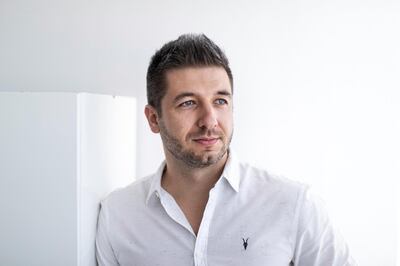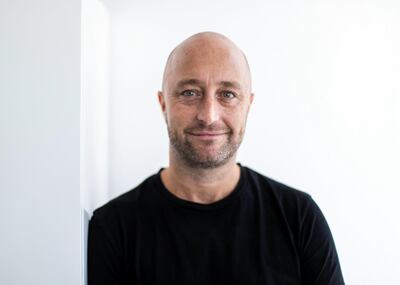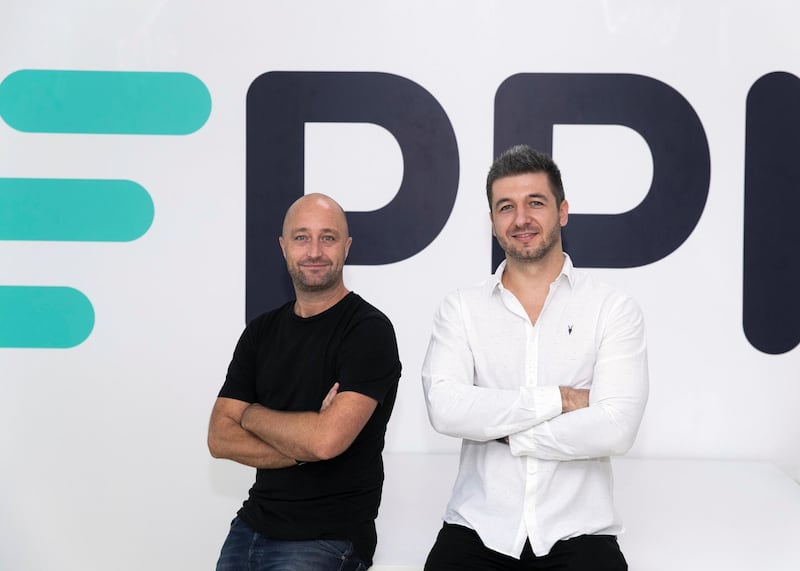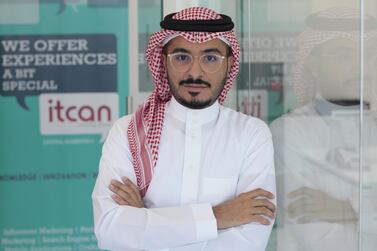It was a “really small gap” in the market that inspired start-up founders Joe Franklin and Milos Savic to set up Steppi, a platform that rewards users for engaging in physical activity.
The duo worked for US wearable technology company Fitbit in Dubai when new government regulations were unveiled last year on the use of information and communication technology in the UAE's healthcare sector.
Under the country's ICT Health Law, health data such as activity levels recorded by wearable devices could no longer be stored, processed, generated, or transferred outside of the UAE, unless approved by the government.
“The law required that wearable data should be hosted on local servers and none of the big brands could do that, so that is the really small gap in the market we jumped into,” says Mr Franklin, 40.
The result was Steppi, a platform built for the corporate wellness space to help employers motivate their staff to stay fit, with a separate application for individual users that offers discounts on brands if they hit a certain target.
“The goal is to address the inactivity in this region. The ... wider GCC is one of the most inactive regions globally, and that inactivity leads to different illnesses, such as Type 2 diabetes. So we are trying to address that inactivity by rewarding people for being more active,” says Mr Franklin.
“Part of it is educational as well. Why is it important to do 10,000 steps a day? Not everyone understand these kinds of statistics.”
The entrepreneurs began working on the concept 18 months ago, resigning from their roles at Fitbit – where Mr Franklin worked as a sales manager and Mr Savic, 37, as a brand manager – to focus on the venture full-time in October 2019.
The app was launched in February, at a time when the coronavirus pandemic was starting to take hold around the world.
“Covid-19 probably slowed us down as we were relying in some respect on corporates for the business-to-business model and then on F&B for the business-to-consumer model," says Mr Franklin.
"With the handbrake being applied to the market, we slowed down in line with the restrictions, but because we were so new and didn't have the big overheads of more mature companies, it enabled us to ride the storm a bit easier."
However, as the UAE began to ease movement restrictions and the market reopened, Steppi registered an increase in demand.
Under its B2B model, the company supplies software to organisations that collect data on the activity levels of their workforce from wearable devices and smartphones.
“We then build-in incentives to our platform to drive engagement,” says Mr Franklin.

For employers, a more active workforce means a healthier team, says Mr Savic, which can translate into lower insurance premiums over the long term.
The platform can also help employers engage their staff, he said, as sets targets, with rewards offered for those that achieve them.
On the B2C product, people downloading and using the Steppi app receive rewards from retailers or food and beverage shops for hitting targets linked to their number of steps, active minutes or distances covered.
The data is recorded on wearable devices by brands such as Fitbit, Garmin or Apple. The app can connect with smartphones through Apple Health or Google Fit apps.
“You could get 30 per cent off with All Saints, as an example, for 10,000 steps. We’ve got hundreds of different vendors on our platform, across F&B shopping and attractions," says Mr Franklin.
“What we are trying to do is build that platform of rewards, similar to The Entertainer model, but [one that is] underpinned by [efforts to] encourage people to be more active. It's free to use for the user.”
While Covid-19 slowed down the company's growth in the early days, it has also played into their hands as remote working and the fear of being infected encouraged residents to address their fitness levels.
“That is the beauty of our platform because it is a digital platform that can be running in or outside the office,” says Mr Franklin.
“Some of our clients doubled down on this during the lockdown period and we have seen some fantastic results with engagement levels of up to 95 per cent and increase in activity levels of 80 per cent-plus – so really strong results so far.
“We are fortunate that the coronavirus has brought health and wellness under the microscope. You see more people out walking and jogging and [companies] are now looking at how do we invest in our workforce to make sure that they're healthy, active and engaged.”
While the company secured 3,000 users in March, April and May, that figure is on track to exceed 10,000 by the end of this month, with plans to hit 200,000 by year-end.
To help fuel that growth, the duo secured a second seed-round of investment of $720,000 (Dh2.64 million) at the end of June from investors.
Their first round, partly financed by their own savings and partly by silent investors, helped the business reach the “proof of concept stage”, while the latest funds will be used for marketing, recruitment and technology investment, says Mr Franklin.
The entrepreneurs recently hired three employees in business development roles, taking their staff count to five as they look to grow within the UAE and beyond.
Their first target is to expand into the GCC, with Saudi Arabia being the main focus, followed by Oman. They are also looking further afield at locations such as Canada.
“Of course, our dream is to have a global app,” says Mr Savic. “So our purpose is to improve the well-being of the entire population. That’s what we are shooting for.”
To help them scale to a global level, the company’s B2C consumer app is free for users with vendors charged on a payment-per-transaction model if a user takes up a reward.
The B2B business concept relies on a software subscription model, with clients paying a monthly fee of about Dh5 to gain access to the platform.
“If you look at that across an annual model at Dh60 per employee, for the data and the change in behaviour that we present, it is a good investment,” Mr Franklin says.
Mr Slavic said the platform is also inclusive as it includes all activity levels, even when companies organise football or basketball tournaments to motivate staff.
“You can have teams competing to achieve a challenge of 30 active minutes per day. It is inclusive of everyone, no matter how active you are,” he says.
Q&A with Joe Franklin, co-founder of Steppi

What has been your biggest challenge?
One of them was the banking. As a new start-up, opening a bank account should not have been as difficult as it was. Some of the hoops we had to jump through in this market, [the process] was still archaic. Things don’t move quickly enough. It took months to get a company bank account, which was painful. We were not looking for credit or anything, so it was very time consuming.
If you could start all over again, what would you do differently?
Nothing, at this point, We are happy with the progress we have made. The first [fund-raising] round got us to market with the proof of concept and the second was to get out of that soft launch phase and into the growth phase. We have not adapted the business model at all; we have changed a couple of the commercials to make it easier for vendors [during the health crisis], but I do not think we would change anything.
If you had known a pandemic was coming, would you have still gone ahead?
Yes. This pandemic is a short-term disruption [while] overall health and wellness is a long-term play. Governments are looking for solutions to address this inactivity – [as it causes] diabetes and other inactivity-related illnesses. That opportunity will only get stronger as the problem gets worse.
What other start-ups inspire you?
Having worked with them, we took a lot of inspiration from Fitbit. They have a similar vision of a healthier population and the product we have created supports that vision. We still work with Fitbit on a number of different things. [For] clients that want hardware to go with our programmes, we work with a number of wearables, including Fitbit and Garmin.
How are you building a defendable business?
We just want to scale [up] quickly. We feel we are the strongest product in the market, in this space, and we are the fastest-growing business.









